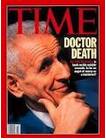|
The Feel-Good Guide to Sports, Travel, Shopping & Entertainment
|
| Main | Sports Events | Holidays & Observances | Pop Culture | Shopping | Travel |
|
MAIN
A hot button issue in the areas of medicine, law and religion, euthanasia (from the Greek for easy death) continues to spark controversy.
Indeed, animals are routinely and gently put down every day due to fatal illnesses or when they are in great pain. Why not provide the same options for people that benefit pets when all hope is lost and their suffering unbearable? Besides, we all hear stories everyday pointing to the fact that euthanasia may be in practice common throughout hospices and nursing homes. Why then not legalize the system so it can be made safer and better regulated? Already legal in Holland, Luxembourg and Belgium (and permitted in Switzerland if performed by a non-doctor), the practice is also being actively supported elsewhere in Europe by those who are fighting for decriminalization. In the US, the State of Washington, Montana, and Oregon have already passed laws in support of euthanasia while a recent Gallop poll finds that the vast majority of Americans continue to support "right-to-die" laws for terminally ill patients.
Often at the front lines of life and death, doctors are sworn in their practices by the Hippocratic oath to "first do no harm." As a result, (and with perhaps the legal ramifications coming into play as well) more than half of all doctors in the US object to the practice of euthanasia. Moreover, traditional religious objections to euthanasia continue to preach the sinfulness of interfering with the "natural process of pain and suffering" that may all be a part of God's plan. Moral ethicists meanwhile also point to the slippery slope that society risks if it allows right-to-die legislation leading to temptations to euthanize the poor, the elderly and even minorities. Finally, if society gives blanket approval in the future might it not encourage the depressed elderly or troubled teens to take their own lives if they so choose? While the debate rages around family kitchen tables and in government legislatures, find more information about euthanasia around the Web with balanced discussions on the pros and cons, related resources, and personal stories:
Euthanasia.com - A large repository of news articles and features, fact sheets, legal reporting, editorials, pros and cons, religious statements and ethical discussions, personal stories and first-hand accounts, examples of living wills, and related resources from the US and around the world. BBC - Ethics: Euthanasia - An extensive guide to euthanasia and assisted suicide with key terms and definitions including the various forms of euthanasia, discussions on ethical concerns and religious teachings, arguments for and against, and related news reporting. |
||


